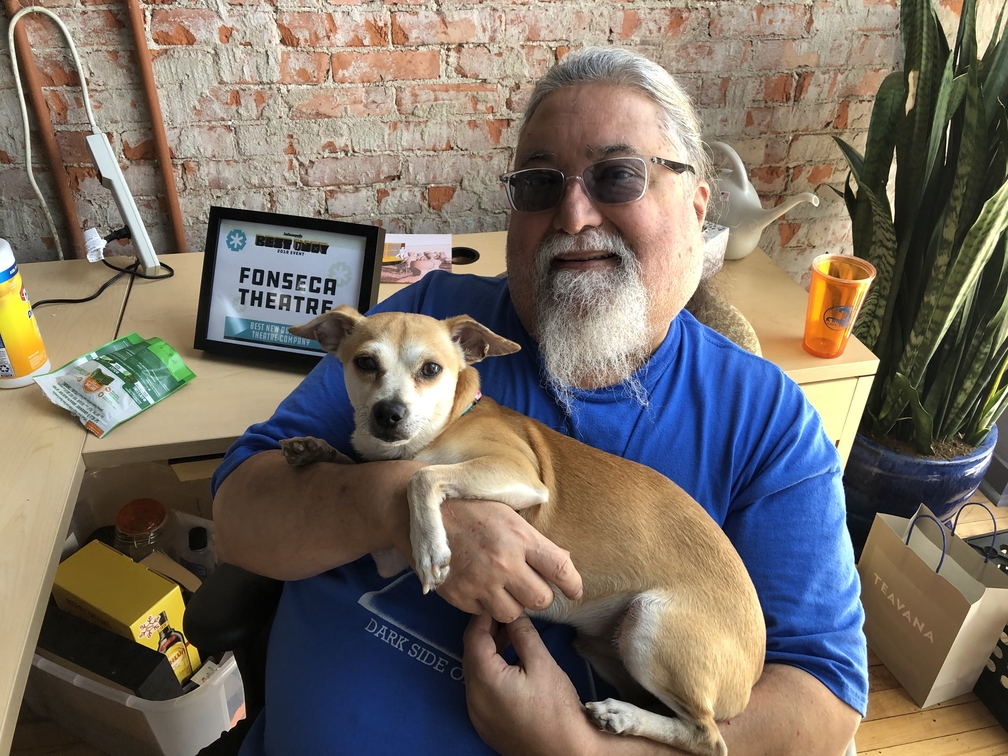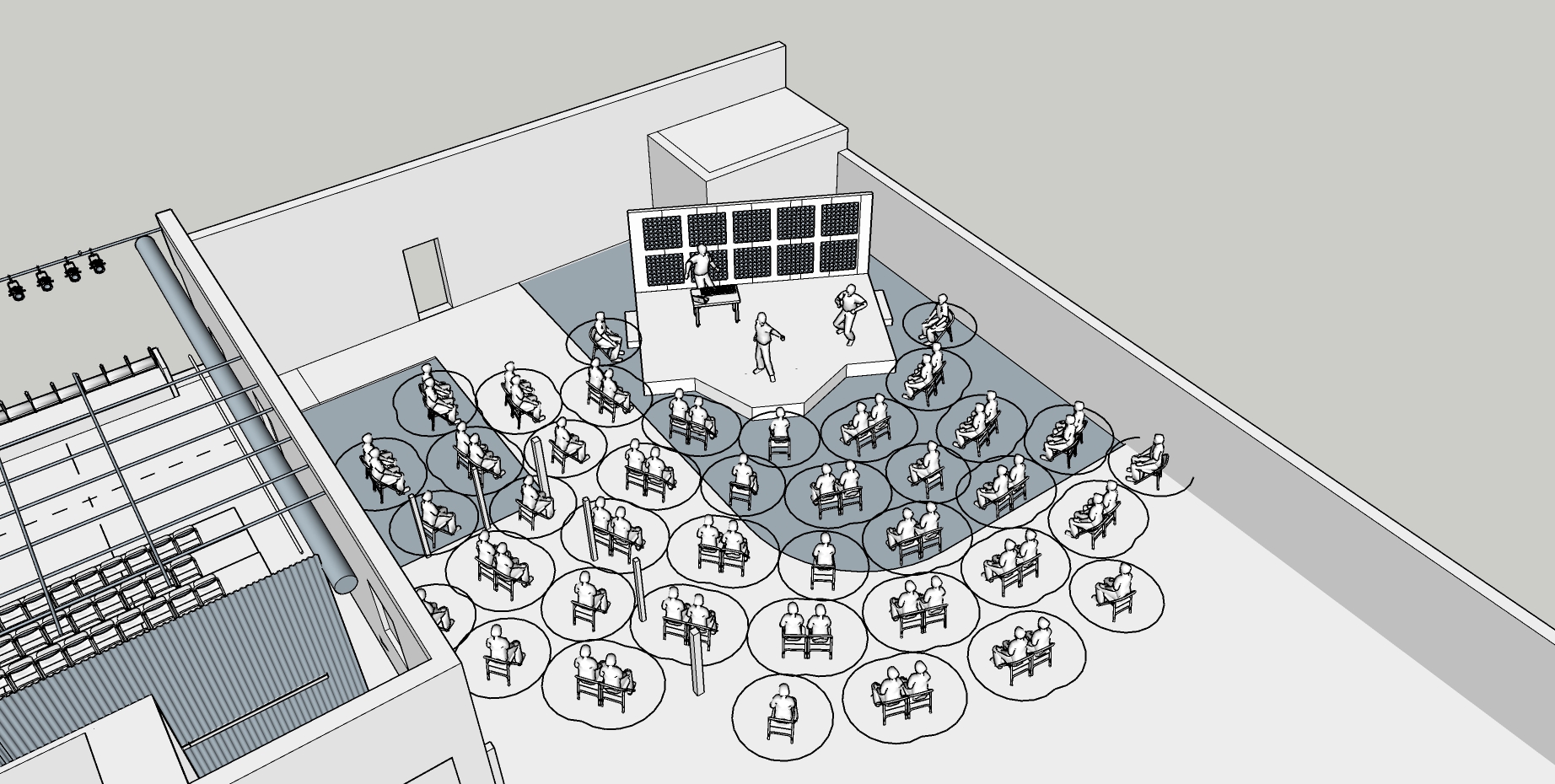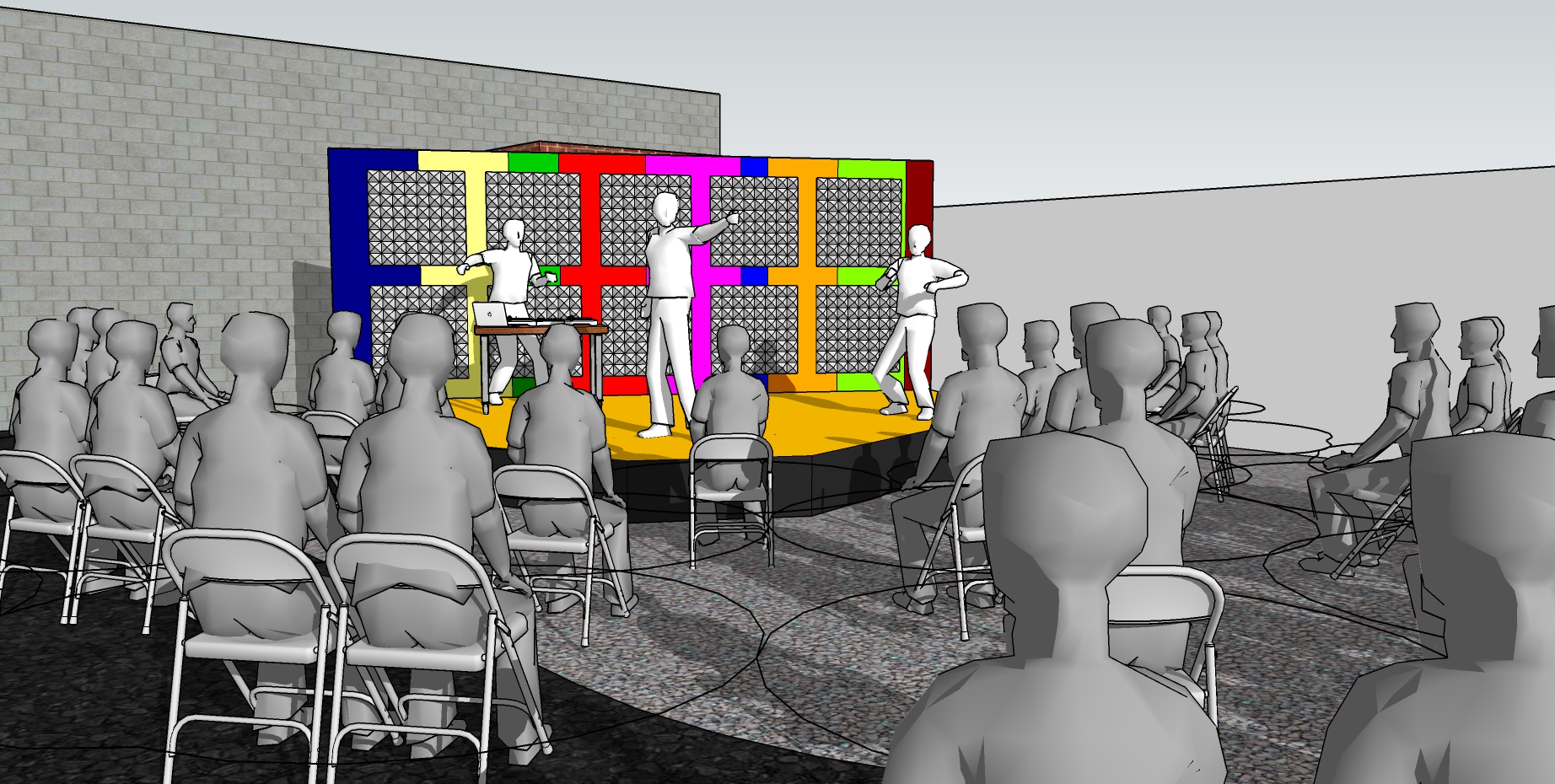
Bryan Fonseca and his dog Buddy. Photo by Tom Alvarez.
In the aftermath of the protests against racism and George Floyd’s horrendous murder, it is clear that demanded changes and reforms, if implemented, will have a lasting effect on our country and the status quo. Theatre, has always been in the vanguard of change for its role in holding up a mirror to society, exploring all its facets, including its ills. But even it suffers from institutional racism, a fact that is now being acknowledged as a light is being shined on its policies and programming by artists of color and their allies who are confronting it.
One who had led the charge and singlehandedly changed the landscape of theatre when it comes to diversity and inclusiveness in Indianapolis is Bryan Fonseca, artistic director of Fonseca Theatre Company. The former artistic director of Phoenix Theatre, which he founded in 1983, Fonseca, in a controversial move, was replaced in 2018. That same year, Fonseca founded the Fonseca Theatre Company, which is now housed in the Basile Building in the Haughville neighborhood on Indy’s Near Westside. Like the rest of the city’s theaters, FTC has been shuttered since Governor Eric J. Holcomb’s stay -at-home order for COVID-19 went into effect in late March. Now, coinciding with stage five of the state’s reopening plan, FTC is preparing to resume operations in July.
Perhaps foretelling the profound change that seems inevitable is the FTC vision statement, “The Fonseca Theatre Company exists to give voice to and celebrate the minority communities of Indianapolis through the prism of purposeful theater and civic engagement. The goal is to bring about social justice through programs which educate, illuminate, and ignite conversations on equity, diversity, and inclusion.” FTC’s blueprint for advancing needed change in Central Indiana is its mission that couldn’t be more timely or relevant. It reads “The Fonseca Theatre Company is a company of artists (80% People of Color) who will give voice to the disenfranchised in our community. The sharing of culture is essential to our nation’s health, and we will focus on work by and/or about minority artists to bring together the city’s growing minority communities. The Fonseca Theatre Company thinks globally but focuses locally.”
The lives of Fonseca and myself, who both share a Mexican heritage and are both gay, have been intertwined ever since he first arrived in Indy in 1979. I first met him when he cast me in “Marat/Sade,” a play he directed when he was artistic director of the former Broad Ripple Playhouse. Our personal and professional relationship deepened when he asked me to be a founding board member of Phoenix Theatre, where I also performed in several productions. Our bond further solidified when he invited me to become a founding member of FTC. Our history continued when Magic Thread Cabaret, which I manage with my producing partner Dustin Klein, partnered with the FTC, where we presented “Les Chanteuses,” in February. A tribute to African-American divas and the songs they made famous, the revue was a critical and box-office success.
A few days ago, I sat down with Fonseca at the Basile Building to discuss the FTC’s plan to reopen, the Black Lives Matters movement, his own experience with institutional racism and other relevant topics. Following is an edited transcript of our conversation.
How and when does FTC plan to reopen?
We are reopening on July 9. Following a lot of recommendations and guidelines, we plan to do a number of months outdoors while the weather is good, so that could take us into September and even into October. We are drawing up plans to create an outdoor stage. We are putting together the production budgets, the cost of renting equipment for outdoor lighting. We already own the sound equipment. We have a good number of microphones. We think most people will feel more comfortable going outdoors and going to the theatre as a result. And it looks good. The plans look good. The stage will face Haughville Park and our first show is kind of a rap musical and I am hoping that music and that message will carry out into the park and maybe, just maybe, some of the people playing basketball, some of the kids just out there might come forward and want to know “Hey what’s going on?” and of course, it’s just free for them to stand in the back of the theatre.
Tell me about the play.
It’s a play called “Hype Man: a break beat play.” It will run July 9 through July 26. It’s by Idris Goodwin. The play couldn’t be timelier. It’s a play I read three years ago through the NNPN (National New Play Network). It’s the story of a three-person group, a white rapper, a black hype man, the guy who goes out first and gets the crowd going and co-signs on the things the rapper is saying, and then a female of mixed race who is the DJ. And they kind of grew up together and kind of not. They are from the same area of town, but everybody’s life experiences are different and that is part of the message of the play.
The play is essentially about a group that is going to have their big break and a couple of days before their big break, there is a police-action shooting, which causes the black artist to want to make a statement on national TV. Once he does, it gets at the core conflict between the white rapper and the black hype man and there is a lot of discussion about “We may have attended the same parties and the same schools and had similar experiences, but you really don’t know my life.” And the white rapper does not want to be political and make a political statement with his art. So, there is the conflict and there’s a lot of great conversation or argument. I don’t want to give too much away, but like all plays, there’s a resolution and it just feels like the right thing at the right time.
Is the show cast?
We are co-producing the play with Aaron “Gritty” Grinter, who was in our production of “Salt Pepper Ketchup.” He plays Verb the hype man. He cast the other roles that include Grant Byrne who plays Pinnacle, the rapper and Paige Neeley as Peep One, the beat maker. I am very excited to be working with another company. I am also very excited to be working with Daniel Martin, who is directing for us. He’s an actor who a lot of people in town know. He was one of the founding members of Act A Foo Improv Crew. He has been doing work at the IRT, understudying mostly, but you would recognize him, I know because you’ve seen him in Fringe. Daniel Uhde is doing all the technical work and I am pursuing a costumer who Gritty has recommended because the point of this is to get as many new, young artists of color involved with us on production.
Do you think other local theatre groups will follow suit once FTC opens?
A lot of the arts groups are concerned about a number of things. Can they retrofit their spaces to accommodate social distancing? That’s necessary as well for the artists involved. Then there is the cost of eliminating seats. For some of the larger auditoriums, they can’t create a business model that works to cover those production expenses. Now, us being small and nimble, we can not only remove seats once we move indoors, our plan is to put seating on the opposite side of the current seating and create alley staging, so that the seats we take out, entire rows we take out on one side, we will put on the other side with the appropriate social distancing. And then we will eliminate seats between seats. So, we might only seat 55, maybe 60, for a while within the space once we open inside, but for us, playing to 50 to 60 people a night is a business model that we’ve based ourselves on.
What about the actors? How will they be kept safe?
We’ll cast smaller shows so there is more distance in the staging itself. It will eliminate us doing shows with a lot of intimate scenes. No kissing. No sex…(laughs)…right out the window. We’re nimble in that way as well. We’re also nimble in that we are going to do shows outdoors in July, August, September and maybe into October, which allows the audience to feel more comfortable coming back to the theatre.

Proposed Fonseca Theatre Company Courtyard stage and seating plan.
There is some evidence that the virus does not like heat and humidity.
Yes. Entirely possible, but it is the perception of the audience feeling safe. That’s why we want to be outdoors. We know that it is safer than being indoors, but it is also a perception outdoors. We will still require everybody to wear masks. We will still have hand-washing stations and sanitizer available. We will do shows without intermission so you don’t have to use the restroom, if you plan smartly, but they’ll be available in case of emergencies, but we are trying to cut down on the need to come into the theatre, come into the physical space, for quite a while.
We are applying to various sources for funding to completely clean the space and sanitize the space and purchase necessary equipment for the re-cleaning and re-sanitizing and put that on a regular schedule. And even chairs outside can be sanitized between each performance. There is a wonderful spray sanitizer that we are looking at that is kind of an industrial use and shot through a sprayer. It’s also safe for upholstery and carpets.
I understand that you and other arts organization administrators have been guided by the Arts Council of Indianapolis in regular meetings.
Yes, the work of the council is so amazingly thorough. They have someone who has been up to date on the city requirements, with the state requirement, with the national field and every angle of reopening for theatres are being discussed.

Do you think other local theatres will follow suit once you reopen?
I know other theatres are planning how and when they can open. I don’t even know if we’ll be first in July. It will be damn close. But everybody is trying to figure out how to get back to it. The disadvantage to us being new and young is that we have no cash reserve. We have no endowment and 14 weeks of no income from ticket sales is one issue and that is bad enough. But if you think about it, and you know this from people coming to your shows, people give money when they are at your shows and connecting to your material. You get more. You get newer donors and you get more response from your current donors because that’s why they are giving in the first place. They are connecting with something you are doing, what your mission is.
Let’s shift gears. Regarding current events, I can’t help but think about how you have always been ahead of the curve as an artist and agent for change when it comes to racial equality and diversity. I know you have been reluctant to discuss your exit from Phoenix Theatre due to confidentiality concerns, but what can you tell me?
Here’s the interesting thing and this is what I can say as an artist in this community. And as a person who created a mission statement for the organization. I lived that mission statement and I don’t believe the organization is holding up to that mission statement and you can test that theory in this way. By the time I left the organization, I had moved our programming up to 50-60 percent of the things you saw on stage were written by, which we also required, people of color. And that took years to develop the audience that would accept that material or finding the audience for the material. Those were two different objectives. When I came to Indy, Indianapolis audiences weren’t used to seeing black plays, brown plays, Asian plays, or gay plays. It took me a long time to develop that. They are now back to that ratio where I was two decades ago. They may say they have renters who promote diversity, but they, themselves, have slipped. Those are the facts. And I am a little pissed, as an artist of color, that they are holding on to a mission statement they do not follow through on or uphold and they use the language I created. That really makes me angry. But they can run the organization any way they want, but they are behind the curve and, like all white institutions in this country, being called out now. They are going to have to decide now, are they going to walk the walk or are they just talking the talk?
With this social revolution unfolding, do you feel validated?
Absolutely. I was saying for years, it is people of color. It is our time. It is way past due in the arts. We needed voices at the table controlling the narrative and I’m not talking about someone lower down on your staff, I am talking about people in the major decision-making positions and here is what I can say because this is just fact. I came back five years ago from a fabulous national conference for theatre companies, a three-day conference on unpacking systemic racism in the arts. I came back and told the board of directors, at that time, who were concerned about my succession plan and I said, “This is how much longer I would like to work, but this is what’s important to me that happens with this institution once I am gone.” I recommended they hire an artistic director, a person of color, in their 30s and a female. And what did they do? Without a national search, any search whatsoever, they hired a straight, white man in his 50s. So, don’t talk to me about that group of people doing anything for people of color in this community. Once again, these are the facts.
Let’s go back to FTC. What else can you tell me about reopening plans?
I want to jump back to demographics. Why do I think people will come back to the theatre? Who are we are seeing out at the protests? A lot of our audience are people of color and that is who you see protesting. A lot of our audiences are young and that is who is protesting. A lot of our audiences are culturally starved for entertainment, driven people and that’s who is protesting and wanting their voices heard.
What about white people? How can they educate themselves?
That is the thing that theatre does. Also, just have a conversation with a person of color. If you are not comfortable talking about race, just have dinner with a friend who is a person of color and ask, “What has your life been like?” There are so many people wanting to know, but you need to go out and find the answers. Don’t come to me and ask what books I should read or movies to see.
What about the decision makers at theatres who claim they can’t find people of color to serve on their boards?
That has been the argument for years with people in this town. They claim, “We tried to diversify and get people of color on our board, but we just can’t find them because they are in such demand. They are already on three or four boards.” What? With a population this size? Are you telling me there are only 100 people of color who are on all of these boards and that’s it?
As a gay man, what do you think the BLM movement can learn from the LGTBQ+ fight for equality?
I believe with the onset of AIDS, the LGTBQ+ rights people were forced to come together. It forced our community to learn how to organize, forced the community to become part of the same political system and learn how to use it to their advantage. I always felt like the Black Lives Matter, the Me Too Movement or any marginalized movement have a model to follow, right from needing influential allies, down to grassroots tactics. There is no smarter movement still than The AIDS Quilt.
Do you think white people really now understand white privilege?
Yes. Many do. Not everybody. A lot of people really don’t get it and don’t understand They mean well, but meaning well doesn’t get it.
How does FTC plan to capitalize on this moment in time?
Amplify the voice, amplify the mission, amplify the programming. Be more inclusive than I already am and, at the same time, just try to stay afloat.
What is your message to the people of color and our allies?
We are still on the precipice of revolution and revolutionary change. We have to keep pushing. We can’t retreat. Not budge. Not give an inch. Once again, don’t be placated too soon or at all by small change. Demand more. Vote. Get involved on the local level. Everything grows from the ground up. Change is grassroots.
For tickets and information about “Hype Man: a break beat play,” go to fonsecatheatre.org.
,





